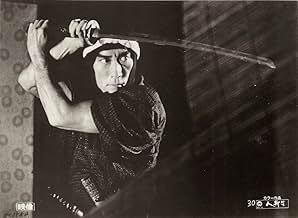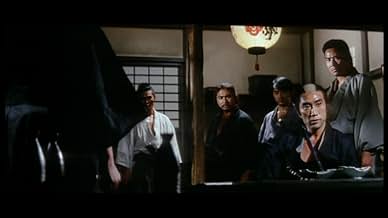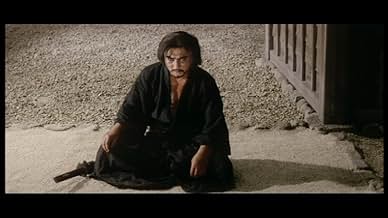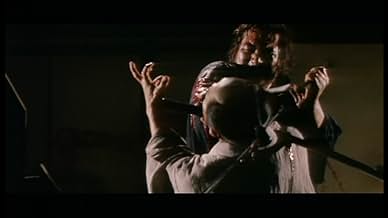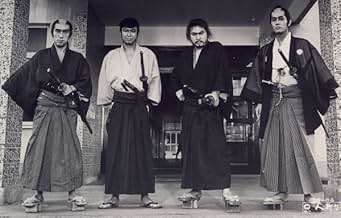Hitokiri
- 1969
- 2 Std. 20 Min.
IMDb-BEWERTUNG
7,4/10
1296
IHRE BEWERTUNG
Füge eine Handlung in deiner Sprache hinzuA destitute ronin allies himself with an established clan, but its ruthless leader tries to turn him into a mindless killer.A destitute ronin allies himself with an established clan, but its ruthless leader tries to turn him into a mindless killer.A destitute ronin allies himself with an established clan, but its ruthless leader tries to turn him into a mindless killer.
- Regie
- Drehbuch
- Hauptbesetzung
Empfohlene Bewertungen
Hitokiri (which translates roughly as "assassination"), a/k/a "Tenchu" which translates roughly as "divine punishment") showcases Hideo Gosha at the top of his form. Do NOT miss this one, or Gosha's other classic, Goyokin! Hitokiri is not only one of Gosha's best films, it's one of the best "samurai/chambara" films ever made, and perhaps one of the best Japanese films ever exported.
Be warned, all of the intricate plot details in Hitokiri can be a little hard to follow for those unfamiliar with 19th century Japanese history. Even so, the underlying human drama is obvious to all viewers. As per the norm for Gosha, Hitokiri is yet another variation on his traditional theme of "loyalty to one's lord" vs. "doing the right thing". However, Gosha develops his favorite theme with such sophistication, that it's really _the_ movie to see (as a double-feature with Goyokin, of course!)
I suppose it breaks down like this: If you want a simpler, more action-oriented revenge tale, see Goyokin. However, if you want a more thoughtful, multilayered (albeit grim) historical drama, see Tenchu.
(OK, OK, essentially, Tenchu's historical backdrop is the massive power struggle between different samurai clans who are either (1) working to reform, yet preserve, the Tokugawa Shogunate, or (2) trying to install the Emperor Meiji as the supreme ruler of Japan. Of course, those clans working "for" Emperor Meiji were often less interested in "reforming" Japan than in ensuring their own clan more power in the "new world order". Ironically, the entire feudal system was officially abolished as one of the first reforms of the Meiji government. It's twists like this -- Gosha's big on irony -- that make the entire plot all the more bittersweet.)
What distinguishes "Hitokiri" from Gosha's other movies is Gosha's expert color cinematography. Every shot is thoughtfully composed, and (much like Kubrick's Barry Lyndon) each frame of the movie could hold its own as a still composition. Hitokiri really stands out with stunning backdrops, including(as with Goyokin) many riveting seascapes. Just watch the opening sequence, and you're hooked! Make no mistake, this is no Merchant-Ivory period piece: Hitokiri is extremely violent.
What else, other than cool camera work, makes Hitokiri stand out? The performances seem (to me) a bit more subtle in this one. Katsu Shintaro (of Zatoichi / Lone Wolf fame) turns in a star performance as the conflicted protagonist/antihero, Okada Izo. Katsu manages to instill humanity to a character that seems almost more wild animal than villain. Throughout the movie, you're never quite sure if you're engaged or revolted by Okada's character. At the same time, Katsu's portrayal of Okada's ravenous hunger for respect, and his later pathetic attempts at redemption, seem so human that you can't help but feel empathy/sympathy. Of course, after seeing Nakadai Tatsuya play the tortured hero in "Goyokin", it's great to see him play such a ruthless villain in "Hitokiri". He's just perfect, there's nothing more to say!
As a final note, perhaps more interesting to buffs than to casual fans, don't miss the last screen appearance of Mishima Yukio (yes, the closeted gay right-wing ultranationalist novelist who committed suicide by seppuku before the crowd of jeering Japanese military personnel he "kidnapped" in 1970, and had a movie on his life and work made by Paul Schrader), who actually does a pretty solid job of portraying the honorable (for an assassin) Shinbei Tanaka.
Be warned, all of the intricate plot details in Hitokiri can be a little hard to follow for those unfamiliar with 19th century Japanese history. Even so, the underlying human drama is obvious to all viewers. As per the norm for Gosha, Hitokiri is yet another variation on his traditional theme of "loyalty to one's lord" vs. "doing the right thing". However, Gosha develops his favorite theme with such sophistication, that it's really _the_ movie to see (as a double-feature with Goyokin, of course!)
I suppose it breaks down like this: If you want a simpler, more action-oriented revenge tale, see Goyokin. However, if you want a more thoughtful, multilayered (albeit grim) historical drama, see Tenchu.
(OK, OK, essentially, Tenchu's historical backdrop is the massive power struggle between different samurai clans who are either (1) working to reform, yet preserve, the Tokugawa Shogunate, or (2) trying to install the Emperor Meiji as the supreme ruler of Japan. Of course, those clans working "for" Emperor Meiji were often less interested in "reforming" Japan than in ensuring their own clan more power in the "new world order". Ironically, the entire feudal system was officially abolished as one of the first reforms of the Meiji government. It's twists like this -- Gosha's big on irony -- that make the entire plot all the more bittersweet.)
What distinguishes "Hitokiri" from Gosha's other movies is Gosha's expert color cinematography. Every shot is thoughtfully composed, and (much like Kubrick's Barry Lyndon) each frame of the movie could hold its own as a still composition. Hitokiri really stands out with stunning backdrops, including(as with Goyokin) many riveting seascapes. Just watch the opening sequence, and you're hooked! Make no mistake, this is no Merchant-Ivory period piece: Hitokiri is extremely violent.
What else, other than cool camera work, makes Hitokiri stand out? The performances seem (to me) a bit more subtle in this one. Katsu Shintaro (of Zatoichi / Lone Wolf fame) turns in a star performance as the conflicted protagonist/antihero, Okada Izo. Katsu manages to instill humanity to a character that seems almost more wild animal than villain. Throughout the movie, you're never quite sure if you're engaged or revolted by Okada's character. At the same time, Katsu's portrayal of Okada's ravenous hunger for respect, and his later pathetic attempts at redemption, seem so human that you can't help but feel empathy/sympathy. Of course, after seeing Nakadai Tatsuya play the tortured hero in "Goyokin", it's great to see him play such a ruthless villain in "Hitokiri". He's just perfect, there's nothing more to say!
As a final note, perhaps more interesting to buffs than to casual fans, don't miss the last screen appearance of Mishima Yukio (yes, the closeted gay right-wing ultranationalist novelist who committed suicide by seppuku before the crowd of jeering Japanese military personnel he "kidnapped" in 1970, and had a movie on his life and work made by Paul Schrader), who actually does a pretty solid job of portraying the honorable (for an assassin) Shinbei Tanaka.
I love samurai movies, and I've spent a lot of time and energy to seek out them wherever and whenever possible to collect. Shintarô Katsu and Tatsuya Nakadai are both of the iconic actors in many great samurai movies. Yukio Mishima was one of the most famous and controversial Japanese writers in Japanese literature. A samurai movies with these three legendary actors and writers would suppose to be an even greater one, but regretfully, it just turned out to be such a disappointment. The whole movie was ruined by a very bad screenplay, then further ruined by a mediocre director. Something just didn't feel right from the very beginning, a somewhat weird and ridiculous storyline that just not ring true to a typical samurai genre movie. It's also the reason why I couldn't finish it.
Gosha's last great film of the 1960's. A resolute stylist with a great sense of purpose to his films, Gosha teamed up with Shintaro Katsu (of Zatoichi fame) to produce this scathing indictment of mindless nationalist loyalty.
"Tenchu" (heavenly judgment) is the word that the loyalists to the emperor yell while assassinating enemies or "traitors" to the cause. Katsu plays up his character' simple minded allegiance to a manipulative politician all in the name of patriotic pride. Anybody who questions the politician is labeled a "traitor" and becomes an assassination target.
One of the best photographed films ever, many shots are incredible compositions of form, color and light. The fight scenes are frequent and very bloody and brutal. The blood becomes a part of the color palette Gosha uses for his images. Gorgeous and disturbing. While the personal story is simple to follow, the historical background is complicated and while a basic history lesson for this time in Japan would be very helpful you can struggle through the film without it. The few drawbacks to the film are the music track, the length and Katsu's occasional scenery chewing. He has a drunken scene that's way over the top for a film but actually a very accurate depiction of a drunk.
Downbeat but one of the great chambara films.
"Tenchu" (heavenly judgment) is the word that the loyalists to the emperor yell while assassinating enemies or "traitors" to the cause. Katsu plays up his character' simple minded allegiance to a manipulative politician all in the name of patriotic pride. Anybody who questions the politician is labeled a "traitor" and becomes an assassination target.
One of the best photographed films ever, many shots are incredible compositions of form, color and light. The fight scenes are frequent and very bloody and brutal. The blood becomes a part of the color palette Gosha uses for his images. Gorgeous and disturbing. While the personal story is simple to follow, the historical background is complicated and while a basic history lesson for this time in Japan would be very helpful you can struggle through the film without it. The few drawbacks to the film are the music track, the length and Katsu's occasional scenery chewing. He has a drunken scene that's way over the top for a film but actually a very accurate depiction of a drunk.
Downbeat but one of the great chambara films.
It's a testament to Gosha's incredible film-making prowess that he was able to complete both Hitokiri and his stunning masterpiece, Goyokin, in the same year, 1969. And it's a testament to how criminally underrated he remains for the general public (compared to media darlings like the great Akira Kurosawa), that both Hitokiri and Goyokin have received less than 500 votes between the two of them.
Shintaro Katsu is Okada Izo: mad dog killer, loyal to the Tosha clan and their boss Takechi, played by another genre stalwart, Tatsuya Nakadai. The Tosha clan was part of a larger alliance that supported the Emperor against the flailing Shogunate. The historical backdrop is fairly accurate - with Japan's increasing political turmoil between imperialists and the Tokugawa and the pressure by the West to end a 300 year social and political seclusion. It helps a lot to know a thing or two about Japanese history and what eventually led to the Meiji Restoration and the abolition of the Tokugawa Shogunate, but it's not essential by any means. The movie was made primarily for a Japanese audience so certain things are taken for granted but it flows very well for the uninitiated as well.
As one would expect from a Hideo Gosha film in his golden years (the late 60's) the visual palette is breathtaking, the use of external and internal symbolism hiding behind pictorial beauty. Style however is never decorative for Gosha - it is always employed in the service of story.
And speaking of story, Hitokiri is dominated both literally and figuratively by the tortured main character Izo Okada. As most chambara protagonists, Izo finds himself in a moral double-bind, torn between giri (obligation) and ninjo (natural impulse) - although it takes a while for him to realize what exactly his giri is. In the first half of the movie Izo is trying for social self-advancement. Lofty aspirations of social rank and marriage with an aristocrat's daughter - a great progression for someone coming from a farmer's background in the rigid social caste system of 19th century Japan.
The turning point for Izo is when he realizes at what cost self-advancement comes, the loss of identity and by consequence the loss of self. It is at that point that he undergoes a very symbolic transformation from a famous swordsman of the Tosha Clan to a "nameless" drifter without past or future, Torazo the Vagrant. Although not technically nameless and not a genre drifter in Yojimbo's mold, it is the loss of his former self and the cast off of ego, ambition and self-dillusion that allows Izo to see things as they really are and redeem himself.
Hitokiri ends (which I won't reveal here) in the best way any story can end: both positive and negative with a deeply ironic twist that gives Izo the last laugh, a last sardonic remark in the face of death.
Shintaro Katsu is Okada Izo: mad dog killer, loyal to the Tosha clan and their boss Takechi, played by another genre stalwart, Tatsuya Nakadai. The Tosha clan was part of a larger alliance that supported the Emperor against the flailing Shogunate. The historical backdrop is fairly accurate - with Japan's increasing political turmoil between imperialists and the Tokugawa and the pressure by the West to end a 300 year social and political seclusion. It helps a lot to know a thing or two about Japanese history and what eventually led to the Meiji Restoration and the abolition of the Tokugawa Shogunate, but it's not essential by any means. The movie was made primarily for a Japanese audience so certain things are taken for granted but it flows very well for the uninitiated as well.
As one would expect from a Hideo Gosha film in his golden years (the late 60's) the visual palette is breathtaking, the use of external and internal symbolism hiding behind pictorial beauty. Style however is never decorative for Gosha - it is always employed in the service of story.
And speaking of story, Hitokiri is dominated both literally and figuratively by the tortured main character Izo Okada. As most chambara protagonists, Izo finds himself in a moral double-bind, torn between giri (obligation) and ninjo (natural impulse) - although it takes a while for him to realize what exactly his giri is. In the first half of the movie Izo is trying for social self-advancement. Lofty aspirations of social rank and marriage with an aristocrat's daughter - a great progression for someone coming from a farmer's background in the rigid social caste system of 19th century Japan.
The turning point for Izo is when he realizes at what cost self-advancement comes, the loss of identity and by consequence the loss of self. It is at that point that he undergoes a very symbolic transformation from a famous swordsman of the Tosha Clan to a "nameless" drifter without past or future, Torazo the Vagrant. Although not technically nameless and not a genre drifter in Yojimbo's mold, it is the loss of his former self and the cast off of ego, ambition and self-dillusion that allows Izo to see things as they really are and redeem himself.
Hitokiri ends (which I won't reveal here) in the best way any story can end: both positive and negative with a deeply ironic twist that gives Izo the last laugh, a last sardonic remark in the face of death.
This movie is a brilliant lesson on Japanese history set in at the end of the Tokugawa Shogunate shortly before the Shogunate lost a big battle against the loyalist, who wanted the emperor back on the throne to rule Japan. Really, I had to read a lot of history to get the entire background.
Shintaro Katsu (also known as the original Zatoichi) gives a superb performance as Izo Okada, one of the four Hitokiri(=Human Slayer) of the Bakumatsu. He is a simple samurai who looses all of his wealth. In order to have a good life he becomes a retainer of Takechi Hanpei (played by Tatsuya Nakada = Ryonosuke out of Sword of Doom). Hanpei is a ultra-nationalist politician who lets his band of Hitokiri assassinate a lot of high ranking pro-west politicians in order to achieve his political goals. Izo Okada follows his leader without really questioning what they are doing. As long as he has money to go and drink and spend at his whore. Okada's killings get more and more brutal in the course of the movie and he is proud to have a reputation based on fear wherever he goes.
It is a splendid portrait on the life of a simple samurai who gets caught up in political affairs and is really to naive to realize what is happening. First after being betrayed and tortured and always having talks with Sakamoto ( who is a samurai who rejects violence) does he change his ideas and views on life. But too late....
Watch the movie to see the end of Izo Okada...
Shintaro Katsu and the rest of the staff give a brilliant performance. Each actor reaches up to their role. The sword-fights a very unique and fast...probably faster than several movies nowadays...
Check it out if you have the chance!!!
Shintaro Katsu (also known as the original Zatoichi) gives a superb performance as Izo Okada, one of the four Hitokiri(=Human Slayer) of the Bakumatsu. He is a simple samurai who looses all of his wealth. In order to have a good life he becomes a retainer of Takechi Hanpei (played by Tatsuya Nakada = Ryonosuke out of Sword of Doom). Hanpei is a ultra-nationalist politician who lets his band of Hitokiri assassinate a lot of high ranking pro-west politicians in order to achieve his political goals. Izo Okada follows his leader without really questioning what they are doing. As long as he has money to go and drink and spend at his whore. Okada's killings get more and more brutal in the course of the movie and he is proud to have a reputation based on fear wherever he goes.
It is a splendid portrait on the life of a simple samurai who gets caught up in political affairs and is really to naive to realize what is happening. First after being betrayed and tortured and always having talks with Sakamoto ( who is a samurai who rejects violence) does he change his ideas and views on life. But too late....
Watch the movie to see the end of Izo Okada...
Shintaro Katsu and the rest of the staff give a brilliant performance. Each actor reaches up to their role. The sword-fights a very unique and fast...probably faster than several movies nowadays...
Check it out if you have the chance!!!
Wusstest du schon
- WissenswertesYukio Mishima's character commits seppuku and one year later, Mishima himself will commit the same way of ritual suicide.
- VerbindungenVersion of Izo (2004)
Top-Auswahl
Melde dich zum Bewerten an und greife auf die Watchlist für personalisierte Empfehlungen zu.
- How long is Hitokiri?Powered by Alexa
Details
- Laufzeit2 Stunden 20 Minuten
- Sound-Mix
- Seitenverhältnis
- 2.35 : 1
Zu dieser Seite beitragen
Bearbeitung vorschlagen oder fehlenden Inhalt hinzufügen


